Global Humanitarians
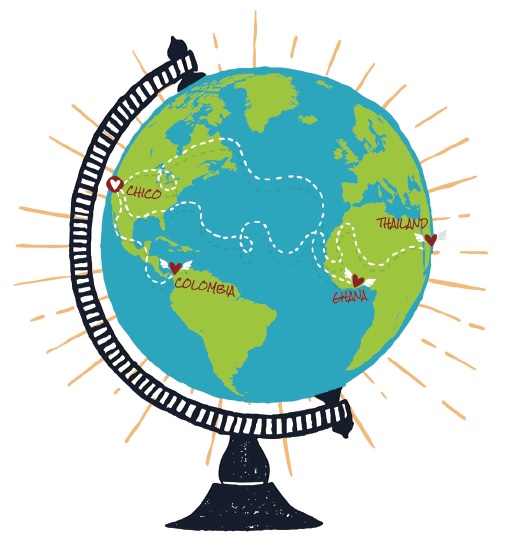
Three Chico State alumni traverse the globe, looking to make a difference in the world by volunteering their time.
Whether photographing childhood slavery in Ghana, improving health care in an impoverished puebla in Colombia, or offering an education to Myanmar refugees facing an unknown future in Thailand, three alumni share two things in common: big hearts and a belief in social justice.
Changing Minds, One Frame at a Time

When Emily Teague first set foot on Ghana’s Lake Volta in February, she saw what appeared to be a family: a dad and four sons fishing on their boat. But the photojournalist saw through that carefully constructed facade.
She was staring slavery in the face. The Global Fund for Children reports that anywhere from 4,000 to 10,000 children can be stationed on Lake Volta at any given time. Extreme poverty in Ghana has driven parents to form illegal contracts with slave masters to sometimes unknowingly send their children to work 14-hour shifts, facing abuse and sometimes death on Lake Volta in exchange for a yearly stipend of $90–$400 USD.
Teague (Attended, Journalism, 2013–15) was overseas pro bono to photograph the abuse for Free the Slaves. The work was part of the international nonprofit’s Growing Up Free project, an initiative that strives to end child trafficking in the African country.
“I had an idea of what that would look like,” Teague said. “Actually going out there, it felt so ordinary, which is terrifying in itself.”
She stayed in Ghana for all of February 2017. She never felt in danger while working, but when she wasn’t in the field, Teague says she experienced harassment daily. Random people would follow her or inappropriately ask to come over, and some men would cross the “friendliness line,” Teague said.
More challenging, she said, was carrying the emotional burden of witnessing slavery while on the lake. Slave masters would say the children were their own, but Teague knew that was a lie. Always with a slave master when she saw them, the children, sometimes six to a boat, never uttered a word. Their faces, however, told stories of undeniable longing—for help, for freedom, for a childhood. Her photography captured both that hope and tragedy.
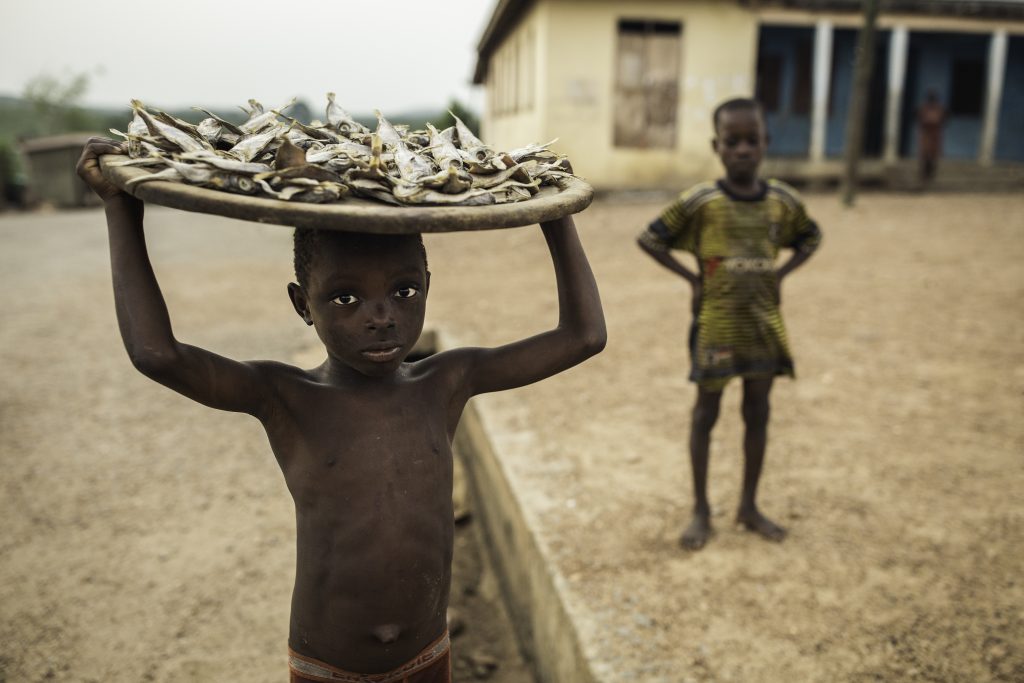
She photographed children like 12-year-old Francis Alehey who literally escaped a dark destiny on the lake after his father sold him into slavery, but she also took photos of children who remained enslaved. Much of her knowledge about what was happening came from the Free the Slaves team, but she would notice children hiding in the water when her boat approached to make the slave master’s argument seem less false.
She struggled emotionally her first time on the lake, the largest manmade reservoir in the world, because she felt she could do nothing to help the children. Ultimately, Teague knew the best way to put an end to their enslavement was by documenting the reality of their lives so that it could be shared with the world. For Teague, her camera was her shield.
“Having that lens and hiding behind it puts that separation up for me,” she explained. “Something about it makes it easier to photograph what I’m photographing.”
That separation is key to successfully completing her work.
“She’s very thoughtful about the people she photographs, very respectful,” said Chico State photography lecturer Aaron Draper. He’s known Teague since she was 16 years old, when her interest in social justice photography was already budding. A student at Inspire Charter Academy, she began taking college-level courses her junior year to feed her hunger for knowledge and further her photographic skills.
She took photos for The Orion, the University’s award-winning student newspaper, including a homelessness photo essay in 2014. That was her first taste of photojournalism, where she thought, “Oh, wow! I can actually change how people see other people.”
Then, came Draper’s photography class the following year. He encouraged students to take on a personal project outside his course, and Teague dreamt big—finding Free the Slaves and sending them a project proposal, initially on child slavery in the chocolate industry. They were looking for a photographer to cover Lake Volta, however, and Teague agreed.
“My first response was, ‘Emily, can’t you do anything safer?’” said Draper, admitting his reluctance to help her write that initial proposal to photograph child trafficking abroad. But Teague was persistent, and she was passionate, and he eventually relented.
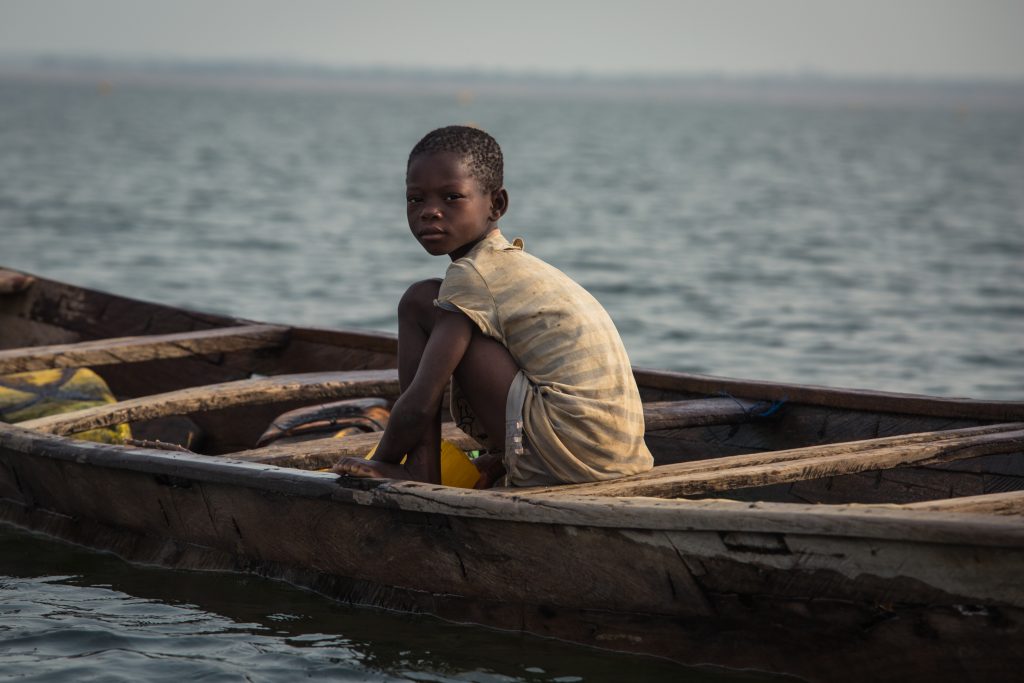
It took two years to transition from proposal to project phase, during which time Teague left college to pursue her photography career, freelancing and interning with Thrillist, a lifestyle magazine based in New York City. While much of Teague’s work has focused on fashion photography, global adventures and social justice are quickly becoming passions of hers
Since returning from Ghana in March, the up-and-coming photographer hasn’t stopped traveling the world, conducting fashion shoots in Spain and England, and feeding her passion for humanitarian work in Greece, where she interviewed Syrian refugees for her blog. They told her about leaving family members behind, life at sea, and the horrific conditions in the refugee camps.
“Each person I met with told me this amazing story about what they had gone through traveling from Syria to Greece,” she said.
She shared their tales on her website—a platform she wants to continue using for future projects.
She plans to work with Free the Slaves again. This time, perhaps in Haiti, where she would document child sex slavery.
“One thing instilled in me growing up was the importance to stand up against injustices,” Teague said. “It’s my hope that my photos will give a platform and voice to those who might not otherwise be heard.”
With her camera in hand, she is determined to change minds one frame at a time.
—Yessenia Funes (Attended, Journalism, 2014) is a freelance journalist based in New York City.
Enabling Education, At Any Cost
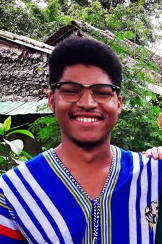 In the Nu Po Refugee Camp in Tak Province, Thailand, the buildings have bamboo walls and thatched roofs. There’s no running water or paved roads, and residents get electricity only three hours in the morning and three hours in the evenings—that’s if the tractor engine-turned-generator cooperates.
In the Nu Po Refugee Camp in Tak Province, Thailand, the buildings have bamboo walls and thatched roofs. There’s no running water or paved roads, and residents get electricity only three hours in the morning and three hours in the evenings—that’s if the tractor engine-turned-generator cooperates.
Dinners by candlelight and showers by bucket are rituals residents of the temporary shelters are accustomed to, says Jonathon Brown (BA, International Relations, ’16), who recently returned from 10 months living and working at the camp as a teacher.
Situated along the Thailand-Myanmar border, Nu Po was established in 1997 and is home to 15,000 people displaced by protracted civil war between the military junta and ethnic minorities in Myanmar. Described as one of the world’s longest-running civil wars, the internal conflict that began nearly 70 years ago has internally displaced at least 2 million people. Neighboring countries have become refuge to an additional 2 million, and in the last decade, about one in four US-bound refugees have come from Myanmar.
At Nu Po, living conditions are sparse. But people can work and go to school, and shops sell nearly everything—food, farming equipment, DVDs, and even Internet access.
Always looming is the specter of the camp being shut down and its residents being forced back into an active conflict zone.
“They’re worried about their families, what they are going to do, what will happen if they go back to their village. Will the government come and try to collect them and their family?” he said. “At the same time, you have to continue your life as best as you can. So you send your kids to school, you continue trying to work, you continue trying to have fun and be active in your community.”
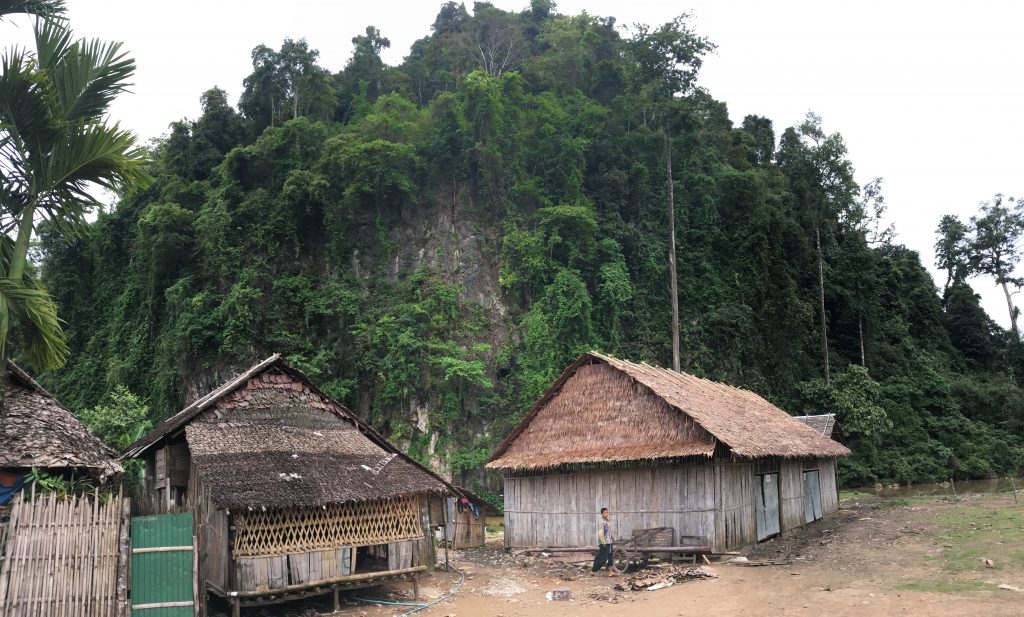
The camp has its own school system, including primary schools, high schools, and three higher-education-level schools. Brown worked at Pu Dooplaya Junior College, where he taught English and the fundamentals of civil society development to about 65 students between the ages of 18 and 25 as a part of a program called the Institute of Higher Education, which has six campuses in the region’s refugee camps.
“Many of the students hope to return to their [refugee camp] communities and help them grow and prosper,” Brown said. “Others wanted to continue their education in Thailand or Myanmar, and some wanted to emigrate to another country and use their skills to benefit their future and family.”
His drive to work with those displaced by conflict was sparked while studying abroad in Istanbul in fall 2014—a volatile time during which Turkey opened its borders to Syrian refugees following a bombing campaign by the United States and allies against Islamic State targets in Syria.
“The streets were flooded with refugees,” Brown said. “Many of them women with little kids, and Turkey didn’t have the capacity to take care of them. I saw that every day. That was pretty heartbreaking.”
Then, a fellow alum of Chico State’s Model United Nations class, in which students take a hands-on approach to learning about foreign policy and international relations, connected him with the Institute of Higher Education.
“When the opportunity came, I jumped at it,” he said.
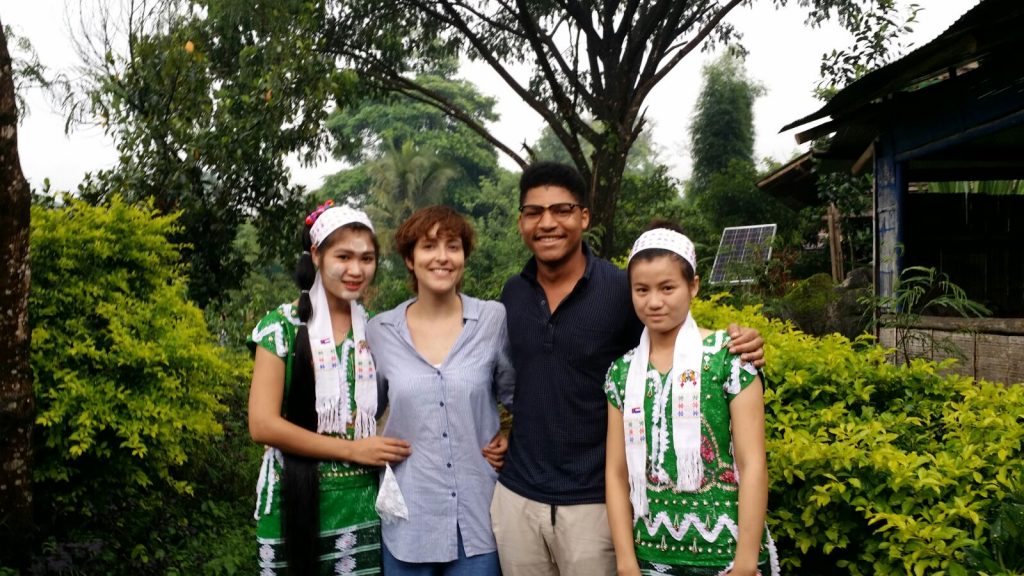
Teaching at Nu Po, it took time to earn the trust of his students, who spoke a variety of different native languages. Plunging into an English immersion experience led to shyness, but over time Brown formed bonds inside and out of the classroom.
He has fond memories of his students’ creativity and competitiveness.
One month, for example, they put on a fashion show, where they turned broken umbrellas and rice bags into dresses, suits, and costumes modeled after Thai and Korean pop stars on magazines covers.
And almost every other day after their six hours of school, they would play intense games of volleyball, barefoot and in the dirt.
Brown said he left Nu Po with a deeper appreciation for international non-governmental organizations and their impact in creating access to education. He also had a greater understanding of extreme poverty.
“You definitely feel appreciative about where you’re from,” he said.
“You look at these people who are such nice people and once you get to know them, they might remind you of your friends from back home.”
—Kacey Gardner (Attended, Journalism, 2009–14) is the communications coordinator for North State Public Radio and also works as a freelancer based in Chico.
Care in a Conflict-Torn Country
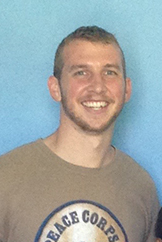 After decades of violence, the Colombian conflict has left more than 260,000 people dead, according to a BBC report on the peace agreement that was initiated in 2016 between the government and leaders of the Revolutionary Armed Forces of Colombia (known as FARC).
After decades of violence, the Colombian conflict has left more than 260,000 people dead, according to a BBC report on the peace agreement that was initiated in 2016 between the government and leaders of the Revolutionary Armed Forces of Colombia (known as FARC).
The United Nations reports nearly 7 million people over the course of 50 years were displaced from their homes—representing the highest number of internally displaced people in the world and more than 10 percent of world’s total displaced population.
“As an era of Colombian conflict is coming to an end, the peace process and post-conflict is very important,” said Trevor Johnson (BA, Spanish, ’13), who joined the Peace Corps in Colombia in January 2016, just six years after the country’s program was reopened after halting in the mid-’80s due to increasing violence among FARC rebels, the government, and drug traffickers.
He lives with a local family and his host mom in a pueblo in northern Colombia, the location of which is undisclosed due to safety and privacy concerns. His primary role is to serve as teacher-trainer, helping local schoolteachers develop practical English language curriculum.
“The town that I live in was heavily affected by paramilitaries and plagued with violence only a decade ago,” said Johnson, who recently completed a small empowerment project with five girls ages 15–17, who explored the conflict’s impact on their community, country, youth, and education.
“They put together an amazing presentation about the history of the conflict,” he said. “I took them on a field trip to share the presentation with recently arrived [Peace Corps] volunteers. Not only did they get to teach important information about their country but . . . as young women, [they had] their voice be heard.”
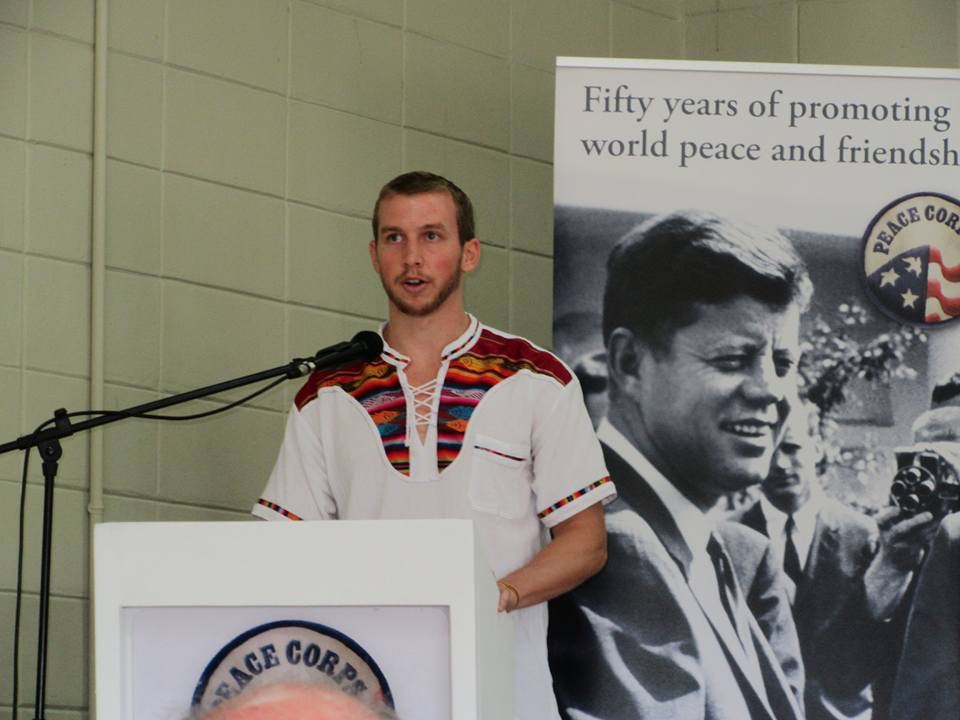
One of the key issues facing Colombian communities today is failing infrastructure, he said. In one of his pueblo’s five neighborhoods, over half of the houses lack proper bathroom plumbing. Damaged septic tanks leak into the streets, exposing residents to raw sewage and various subsequent illnesses, including diarrhea, rashes, and mosquito-borne infections.
He says this leads many of the 500 residents to use the “campo” or field space for raising cows and chickens as a bathroom, contaminating the land and potentially rendering it unusable for future agriculture.
“Community members have identified these environmental hazards as the gravest problem for their neighborhood,” said Johnson, who partnered with another Peace Corps volunteer to submit a grant to the United States Agency for International Development.
All Peace Corps volunteers complete at least one special project outside of their primary role to address a community-identified need. If funded, the grant will help them repair and install septic tanks throughout the neighborhood, conduct environmental education, and offer septic tank maintenance trainings for residents.
Johnson originally enrolled at Chico State as a pre-nursing major, but soon he fell in love with the Spanish language and Latin American culture, studying abroad twice in Spain and Costa Rica.
“I had wonderful experiences studying abroad,” said the San Diego native, who worked as an intern and study abroad program advisor, attending multiple Peace Corps presentations on campus. “But it felt like I was just dipping my toes in. I wanted to do something more long-term and have more direct hands-on work with communities abroad.”
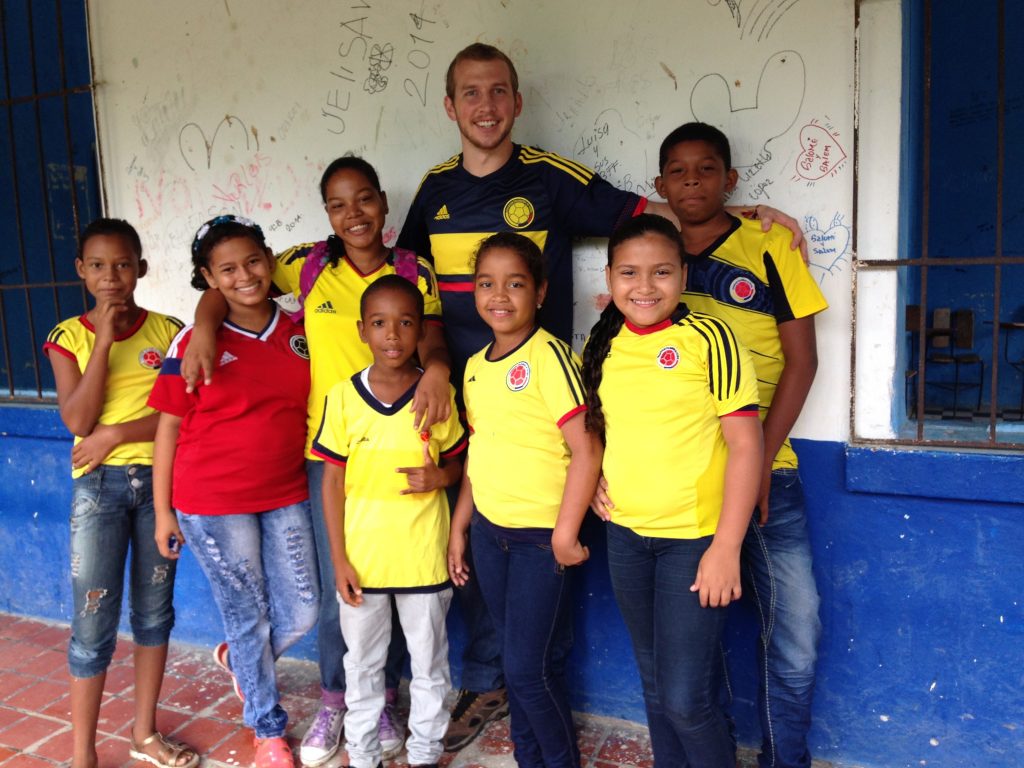
It’s hard to put into words, he says, how incredible it’s been integrating into his Colombian community.
“The overwhelming generosity I have seen and experienced has impacted me more than anything,” he said, noting that his host mom organized his 25th birthday party just three months after he arrived in Colombia.
“I was kind of bummed not being home to celebrate, and my host mom got the contact info for a bunch of the [Peace Corps] volunteers and planned a surprise birthday party for me,” he said. “It was so special. Someone took me into their home, called me their son, and wanted me to be part of their family.”
“I have been given a new set of eyes from which I will never look at life or people the same again,” he added. “My definition of success has changed. My scale of patience has been calibrated differently. My understanding of selflessness and struggle are incredibly more profound. I have been given an experience, which has humbled me in a way that I will never take running water, consistent electricity, or a cupboard and fridge full of food for granted again.”
After completing his service in April 2018, Johnson plans to travel and explore opportunities within the US government or pursue a master’s program in peace and conflict resolution or international development.
—Nicole Williams (BA, Journalism, ’09) is the foundation relations and campaign communications manager for Chico. This story first appeared in Chico Statements.


